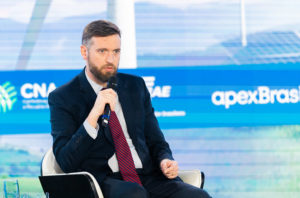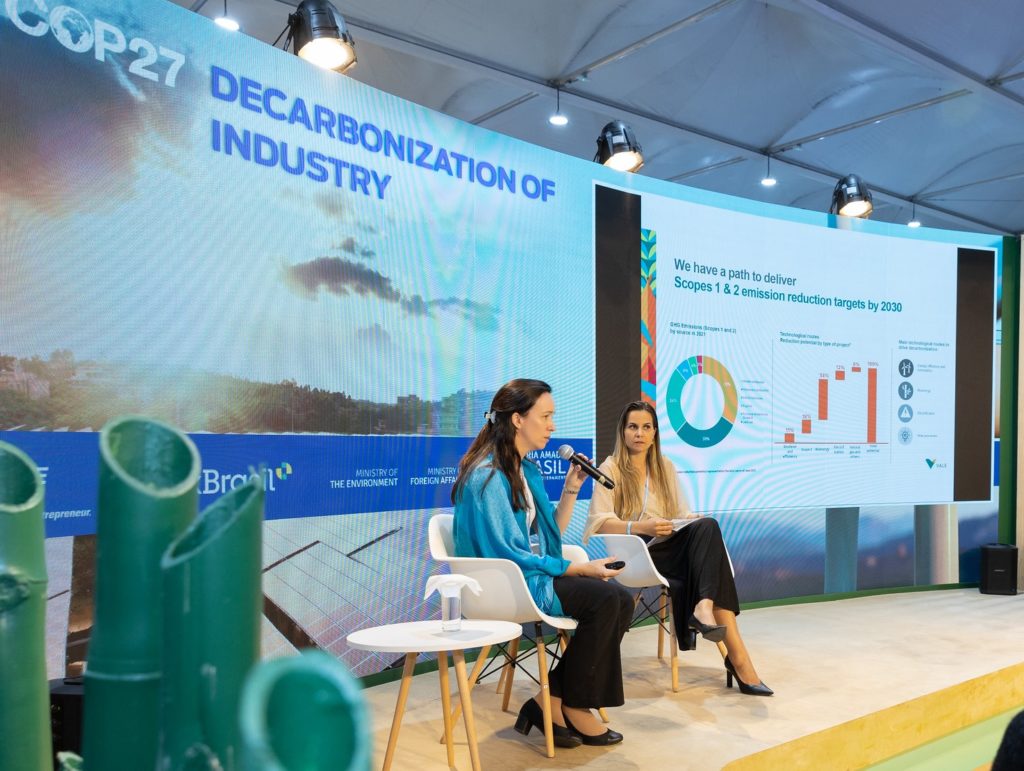Sharm El Sheikh – The Brazil Pavilion at COP27 hosted on Wednesday (9) a panel on Decarbonization of the Industry. Vale Climate Change manager Vivian Mac Knight (pictured above, L) discussed the topic in Sharm El Sheikh with Roberta Cox (R), special adviser to Brazil’s Minister of Environment. Toyota do Brasil Government Affairs manager Bruno Ambrósio spoke from the Brazilian National Confederation of Industry in Brasília.
Mac Knight said that when it comes to decarbonization of the industry, there’s a world of possibilities. She spoke about the main commitments of Vale in this regard, primarily achieving net-zero emissions by 2050, as well as some interim targets. “The first one is reducing scope 1 and 2 [carbon] emissions by 2030, in line with the Paris Agreement; we’ve also pledged to use electricity from renewable sources – 100% of our electricity will come from renewable sources by 2030 worldwide, and 2025 in Brazil,” the manager said. She said Vale has now 90% of its electric power consumption coming from renewable sources.
Essentially, scope 1 and 2 are those emissions that are owned or controlled by a company, whereas scope 3 emissions are a consequence of the activities of the company but occur from sources not owned or controlled by it.
In the case of a mining company like Vale that produces iron ore and base metals, scope 3 becomes very relevant, Mac Knight said. “When we look at Vale’s total emissions, 98% are scope 3, particularly the use of Vale’s products in the steel industry, one of world’s most carbon emitting industries, so we couldn’t have a climate change commitment without addressing scope 3,” she said.
Therefore, Vale set a scope 3 emission target of 15%. “Since this is a very challenging target, as it relies heavily on a partnership with our clients for them to regulate their emissions, we allowed ourselves some flexibility and the possibility of using up to 20% of carbon credits by way of compensation to reach it,” she said.

Mac Knight also informed that the miner protects, alone or in partnership, over 1 million hectares, 800,000 of which in the Amazon. “One of Vale’s forest commitments, in addition to protecting 1 million hectares of forest land, we pledge to increase by over 500,000 hectares of protection or recovery land,” she said.
Bruno Ambrósio of Toyota said the automotive manufacturer looks at its whole production chain, not only the product, from the collection of materials in nature to the consumer use. “Our concern is decarbonization. Toyota has pursued these goals for many years, and we believe there isn’t a single technology to get there,” he said in the panel.
According to him, there are regional differences across the globe, differences in established structure, social needs to be met, and based on that the company has adopted a series of different productions, distinct technologies. “And for Brazil, we strongly believe in a program that started back in the 1970s that is using biofuels. It is more than proven that the Brazilian ethanol has an amazing energy balance,” he said.
Ethanol, when associated with electrification, ushers in a large decarbonization in the automotive industry, Ambrósio said. With that in mind, Toyota launched in 2019 the world’s first hybrid flex car in Brazil, with technology developed by Brazilian engineers. He said that the world has taken a special interest in this technology, as pure electrification only works in more developed countries, which have more infrastructure to implement new technologies.
Read more:
Translated by Guilherme Miranda




